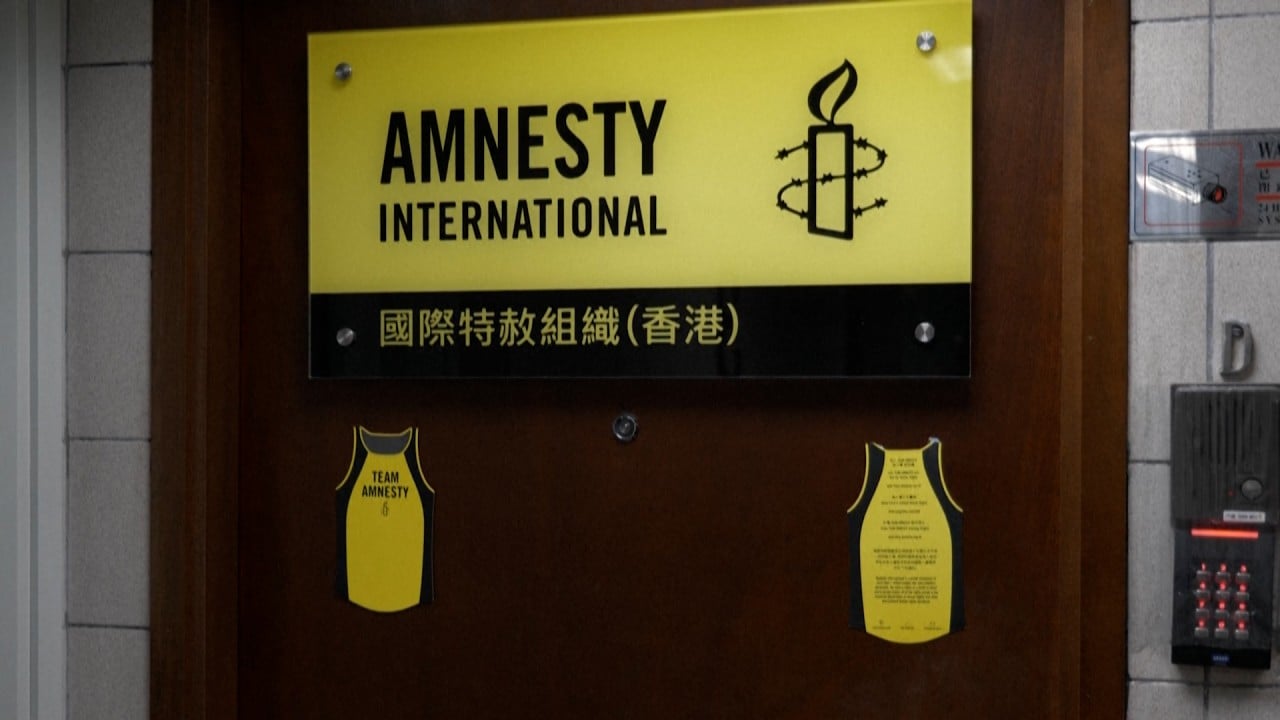
National security law: Amnesty International to close its 2 Hong Kong offices by year’s end, citing impediments to its work
- Group says the security law ‘has made it effectively impossible for human rights organisations in Hong Kong to work freely’
- Amnesty maintains one office in the city focusing on Hong Kong affairs, and another that is part of its regional operations
Amnesty, which established its presence in the city in 1990, said its office focusing on Hong Kong affairs would shut on October 31, while another dealing with regional affairs would close by the end of the year. The regional operations will be taken over by other offices in Asia-Pacific, with Taiwan, Seoul and Tokyo among the locations being discussed. The organisation already has offices in Bangkok and Colombo.
“This decision, made with a heavy heart, has been driven by Hong Kong’s national security law, which has made it effectively impossible for human rights organisations in Hong Kong to work freely and without fear of serious reprisals from the government,” said Anjhula Mya Singh Bais, chair of Amnesty’s international board.
Amnesty committed to Hong Kong despite shrinking space for dissent, new head says
A Security Bureau spokesman said the national security law upheld human rights and stipulated the freedoms enjoyed by residents under the Basic Law and the International Covenant on Civil and Political Rights were protected by law.
Law enforcement actions were based on evidence and had “nothing to do” with “political stance, background or occupation”, he said.
Speaking to the Post from London, deputy secretary general Kyle Ward said that while no direct threat had been made against the Amnesty offices in Hong Kong, the pace at which civil society organisations had been disbanding and the arrest of some of those groups’ leaders had prompted the “difficult” decision to leave the city.
“The noose seems to be tightening a bit closer on civil society overall and therefore it behoved us to make a move before we ended up with someone in prison,” he said.
Ward said another sign that continuing operations in the city was becoming “increasingly untenable” emerged last month when the financial services minister announced charities deemed a threat to national security would lose their tax exempt status.
Some staff members were also anxious about continuing to work or remain in Hong Kong, he added.
While at least eight employees would take voluntary redundancy, Amnesty would continue its work on Hong Kong and mainland China “with the same resources and energy”, Ward said.

01:56
Amnesty International to close its Hong Kong offices by year’s end, citing national security law
Beijing imposed the national security law in June last year to outlaw acts of subversion, secession, terrorism and collusion with foreign forces. Dozens of activists, including former opposition lawmakers, have since been arrested, and at least 35 groups have broken up, including some of the city’s largest unions and activist organisations.
Amnesty, which is based in London, does not have an office in mainland China.
In her first interview with regional media as secretary general of the human rights group in April, Agnes Callamard told the Post that Amnesty was taking “far more” precautions in carrying out its work than it had before the security law’s passage.
Callamard at the time did not rule out the organisation leaving Hong Kong altogether, saying the possibility was “a source of anguish, a source of pain in fact”.
Human rights lawyer Mark Daly said Amnesty’s decision “speaks volumes about Hong Kong’s downward spiral with respect to the rule of law”.
But lawmaker Holden Chow Ho-ding, vice-chairman of the pro-establishment Democratic Alliance for the Betterment and Progress of Hong Kong, said he was “deeply disappointed” by Amnesty’s claim it was no longer able to work in the city without fear of official reprisal and called it “untrue”.
“It is outrageous for any organisation to smear the national security law by unnecessarily closing their branches here,” Chow said.
Harrow Hong Kong drops ‘Amnesty International’ programme after parents raise concerns
Amnesty’s decision had made the European Union concerned over the “rapidly shrinking space for civil society in Hong Kong”, said Foreign Affairs and Security Policy spokeswoman Nabila Massrali
“The EU calls on China to act in accordance with its international commitments and respect Hong Kong’s rights and freedoms,” she said.
Human Rights Watch, which has its headquarters in New York, does not have an office in Hong Kong. Global head Kenneth Roth said in January last year he was denied entry to the Asian financial hub, where he was scheduled to launch the organisation’s latest world report. The group left Hong Kong after it was penalised by Beijing in retaliation for American legislation supporting Hong Kong protesters in 2019, according to The New York Times.
Amnesty’s announcement came as Chinese President Xi Jinping vowed that China would always uphold world peace and international rules in a speech delivered on Monday marking five decades since his country took a seat at the United Nations.
Additional reporting from Finbarr Bermingham

